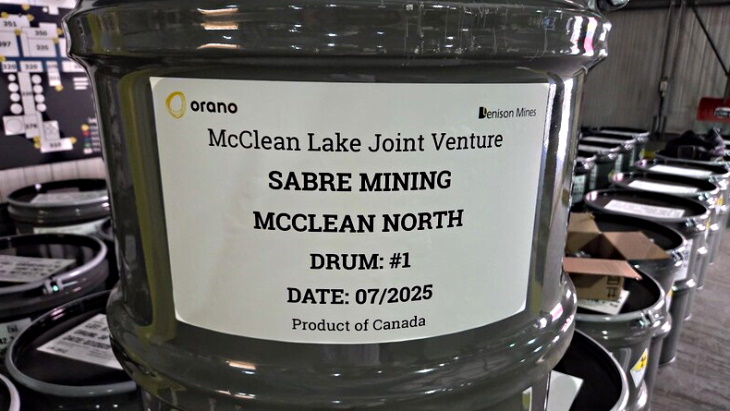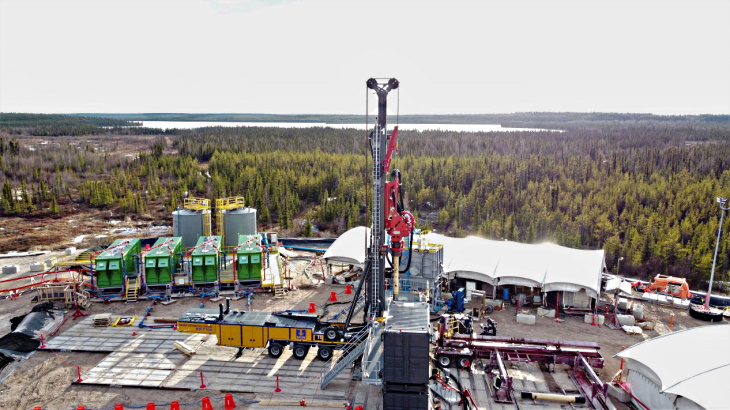McClean Lake is in the eastern part of the Athabasca Basin region in northern Saskatchewan, about 750 kilometres north of Saskatoon. The McClean Lake Joint Venture (MLJV) is 77.5% owned by Orano Canada and 22.5% by Denison. Orano Canada is the operator. Mining operations were suspended in 2008 due to declining uranium prices.
In January 2024, Orano Canada and Denison announced that production was to restart at McClean Lake using their patented Surface Access Borehole Resource Extraction (SABRE) mining method.
At that time, the companies said they intended to begin mining at the McClean North deposit in 2025, targeting production of 800,000 pounds U3O8 (308 tU, 100% basis) in 2025. Around 3 million pounds U3O8 (100% basis) has been identified for potential additional production from a combination of the McClean North and Caribou deposits from 2026 to 2030.
Orano Canada and Denison have now announced that mining of the McClean North deposit using SABRE began last month, with about 250 tonnes of high-grade ore (+10% U3O8) estimated to have been recovered from the first mining cavity. Orano Canada also said it has successfully backfilled the first cavity, advanced the SABRE rig to the planned second mining cavity, and commenced processing of the recovered ore at the McClean Lake mill.

(Image: Denison Mines)
"The first commercial production of uranium with the SABRE technique marks a new chapter, allowing us to access and explore new territories," said Orano Mining President Xavier Saint Martin Tillet. "This innovation reinforces our commitment to delivering a reliable and responsible supply of natural uranium to nuclear power producers worldwide, supporting the generation of low-carbon electricity."
Orano Canada's President and CEO Jim Corman added, "Our long-term investment in R&D within Orano and the MLJV has culminated in the safe mining, milling and packaging of ore that in the past would have been deemed economically challenging to develop ... It truly is an innovative and exciting time to be in the uranium industry."
"The successful commencement of SABRE mining at McClean North marks a significant milestone in the history of the MLJV, as the joint venture returns to active mining operations for the first time since 2008," said Denison President and CEO David Cates.
What is SABRE?
SABRE is a non-entry, surface-based mining method that uses a high-pressure water jet placed at the bottom of a drill hole to excavate a mining cavity. The cuttings from the excavation process are then air lifted to the surface, separated and stockpiled. This innovative mining method can potentially allow economic access to relatively small high-grade orebodies that are either too small or too deep to be mined economically by conventional open-pit and/or underground mining methods, the companies say.

SABRE test at McClean Lake, 2021 (Image: Orano)
SABRE also offers operational and environmental advantages compared with conventional mining techniques. It is selective and scalable, which the companies say makes it suited to changing uranium market conditions, with an expected production ramp-up of months instead of years. It is less intrusive and has a smaller surface footprint than conventional methods, with lower water usage and power consumption, and - as it is a non-entry mining method - minimises radiological exposure for mine workers.
A five-year SABRE test programme was completed at McClean Lake in 2021, excavating some 1,500 tonnes of ore.
"SABRE is unique in that the mining method can be selective and scalable, which has the potential to provide superior flexibility when compared to conventional mining methods and is thus ideally suited to ever changing uranium market conditions - with an expected production ramp up of months instead of years," according to the McClean Lake Joint Venture partners.

_12678.jpg)





_15863.jpg)







